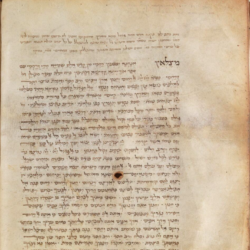I’ve tried to make the ceremony as inclusive as possible to different kinds of families, but it is a ceremony which requires some sort of Jewish teacher/mentor/parent (who’s accepting of you, obviously) to bestow the name upon you. If you don’t have that kind of figure in your life, you may or may not find this ceremony template helpful.
Finally, I personally chose to alternate between the feminine and masculine Hebrew for God, and I’ve maintained my original layout but you should feel free to swap the Names as you see fit, either by switching to all one gender or by making the body and will blessings masculine, and the rest feminine.
This ceremony was remarkably meaningful to me. I hope others find the same spiritual joy in it that I did.
| Hebrew | English |
|---|---|
פתיחה |
Opening |
Transitioner lights Havdalah candle. | |
[Transitioner may explain that the Havdalah candle marks a moment of passage. Both end and beginning.] | |
Transitioner says (in English): Our God, and God of our ancestors, I stand here today to mark a transition. Your commandments tell us to come together in times of change to sanctify them. We celebrate the passing of day into night, we sanctify the space between weeks and call Shabbat holy. | |
Today, I mark my own transition: I join with my [family | community | chosen family] to acknowledge my identity as a Jewish [Woman/Man/Nonbinary Person], to mark the change, and to renew my place in your covenant. | |
בָּרוּךְ אַתָּה ה׳ אֱ-לֹהֵינוּ מֶלֶךְ הָעוֹלָם הַמַּעֲבִיר לְעֹבְרִים׃ |
Barukh ata Adonai Eloheinu Melekh Ha’Olam Ha’Mavir L’Ovrim Blessed are you, YHVH (Adonai) our God, ruler of the universe, helper to those who transform.[1] Cf. Rabbi Eli Kukla, “A Blessing for Transitioning Genders,” TransTorah 2006. Rabbi Kukla writes, “This blessing takes the same form and grammatical structure as classical blessings that mark wondrous occasions. “The Transforming One” as a name for God appears in the traditional blessings of gratitude that are recited each morning. The Hebrew verb root of this word, avar, has multiple layers of meaning within Judaism. Most literally it means to physically cross over, however it also implies spiritual transformation in High Holiday prayers. It lies at the root of the word Ivrim, Hebrew people. We are the Ivrim, the crossing over people, because we physically crossed over the Jordan River to escape from slavery and oppression and spiritually transformed ourselves. At its core, our ancestral sacred memory holds this moment of painful and yet redemptive, physical and spiritual transition. In Modern Hebrew, this same verb root is used to form the word, ma’avar, which means to transition genders.” |
[I have stood before a beit din, a Jewish ritual court, and they have certified with me my plan to change my name and affirm my gender through this ritual.] | |
[I completed a mikveh, a ritual bath, which I used to introspect, to engage in the personal aspect of my spiritual affirmation.] | |
Gender Change | |
Adonai, I now stand before Your people, the people of Israel, and before my broader network of friends and family, to affirm my gender, and my part in your community. Today, I declare and identity myself as a Jewish [Woman/Man/Nonbinary Person], and (take on the unique responsibilities and roles that Jewish [Women/Men] hold in the community and in your covenant) [or] (forge my own [a]gender[ed] path in your covenant and this community, instructed by the hidden Jewish legacy of gender complexity and by your word). | |
Parents or Close Jewish Mentor figure(s) say: Our God and God of our ancestors, bless and sustain this [woman/man/nonbinary person] as [she/he/the] go[es] forth in this world, and take care of [her/him/them] in [hers/his/their] transition. May [her/his/their] life be one of happiness, growth, and learning. May [she/he/they] continue to share joyfully in the traditions of our people. Recommit [her/him/them] to your covenant as she follows [her/his/their] path. Encourage [her/him/them] to live a life filled with Torah and learning, Ḥuppah and companionship, and Ma’asim Tovim. And may [she/he/they] be a blessing on [her/his/their] family for many years to come. And let us say, Amen. | |
בְּרוּכַה אַתְּ יָהּ הַשְּׁכִינָה רוּחַ הָעוֹלָם, שֶׁעָשַֽׂנִי כִּרְצוֹנָהּ׃ |
Transitioner: Brukhah at YAH haShekhinah, ru’aḥ la’Olam, she’asani kirtsonah. Blessed are you, source of being, spirit of the world, who has made me according to Your will.[2] Cf. Rabbi Eli Kukla, “A Blessing for Transitioning Genders,” TransTorah 2006. Rabbi Kukla writes, “The second blessing is also taken from morning liturgy. It is based on the book of Genesis, which teaches that male and female bodies were equally created in God’s image. The Midrash, classical Jewish exegesis, adds that the Adam HaRishon, the first human being formed in God’s likeness, was an androgynos, an intersex person. Hence our tradition teaches that all bodies and genders are created in God’s image whether we identify as men, women, intersex or something else. When we take physical or spiritual steps to more honestly manifest our gender identities we are fulfilling the foundational mitsvah, religious commandment, to be partnered with God in completing the work of creation.” [That midrash, recording a Jewish recounting of the etiology of the human being by Aristophanes in Plato’s Symposium, can be found in Bereshit Rabbah 8:1. –ANV] |
Name Change | |
Up until now my Hebrew name has been [old Hebrew name], | |
[optionally talk about the old name] | |
This name no longer fits my identity as a Jewish [woman/man/nonbinary person]. Thus, I seek to change my name before Adonai. From this day forward, I wish to be known as [new Hebrew name]. This name will be the one by which I am called to Torah, and the name by which I shall be known for all Jewish life-cycle events. | |
[optionally talk about the significance of the name] | |
בְּרוּכַה אַתְּ יָהּ הַשְּׁכִינָה רוּחַ הָעוֹלָם, שֶׁעָשַֽׂנִי בְּצָלְמָהּ׃ |
Brukhah at YAH haShekhinah, ru’aḥ ha’olam she’asani b’tsalmah Blessed are You, source of being, spirit of the world, who has made me in God’s image. |
I have asked [Parents/Trusted Jewish Mentor figures (s)] [to talk about my name, then] to confer my name upon me with their blessing. [Either you or your mentor may talk about the meaning/significance of your name] | |
בָּרוּךְ אַתָּה ה׳ אֱ-לֹהֵינוּ מֶלֶךְ הָעוֹלָם בּוֹרֵא פְּרִי הַגֶּפֶן (הַגָּפֶן)׃ |
All assembled make the following blessing: Barukh atah Adonai eloheinu melekh ha’olam, borei pri hagafen Praised are you, YHVH (Adonai) our god, ruler of the universe, creator of the fruit of the vine. Drink! |
[Jewish friends/mentors read each of the following lines] Adonai, God of our Ancestors, sustain this [child/man/woman/nonbinary person]. In the presence of loved ones, [she/he/they] [is/are] given the name [Chosen English Name], and let [her/him/them] be known in Israel as [Chosen Hebrew name]. | |
May [her/his/their] name be a source of joy and pride to us – [her/his/their] parents – and to all of [her/his/their] family, and all of Israel. | |
May this [person’s chosen] family continue to grow together in health and strength, in harmony, wisdom, and love, our [community] filled with [Jewish traditions,] Joy, and acts of kindness. | |
All together, say: May we all share in the joy of seeing this [young] [Woman/Man/Person] continue to grow [into adulthood], a blessing to [her/his/their] family, [her/his/their] people, and all humanity. And let us say, Amen. | |
extinguish havdalah candle in wine | |
בָּרוּךְ אַתָּה ה׳ אֱ-לֹהֵינוּ מֶלֶךְ הָעוֹלָם שֶׁהֶחֱיָנוּ וְקִיְמָנוּ וְהִגִּיעָנוּ לַזְּמַן הַזֶּה׃ |
Together, recite the following blessing: Barukh ata Adonai Eloheinu Melekh Ha’Olam Sheheḥeyanu, v’kiy’manu, v’higiyanu laz’man hazeh Blessed are you, YHVH (Adonai) our God, Ruler of the Universe, who has given us life, sustained us, and brought us to this joyous time. |
Individual parent/Jewish Mentor Figure: I offer the following benediction to [Name], and use the same holy words that our priests used thousands of years ago to bless the ancient tribes of our people: | |
יְשִׂימֵךְ אֱלֹהִים כְּשָׂרָה רִבְקָה רָחֵל וְלֵאָה יְבָרְכֵךְ ה׳ וְיִשְׁמְרֵךְ. יָאֵר ה׳ פָּנָיו אֵלַיִךְ וְיִחָנֵּךְ. יִשָּׂא ה׳ פָּנָיו אֵלַיִךְ וְיָשֵׂם לָךְ שָׁלוֹם׃ |
For a woman, say: May you be like Sarah, Rivqah, Raḥel, and Le’ah May God bless you and guard you. May God show you favor and be gracious to you. May God show you kindness and grant you peace.[3] Cf. Numbers 6:24-26. |
יְשִׂימְךָ אֱלֹהִים כְּאֶפְרַיִם וְכִמְנַשֶּׁה יְבָרֶכְךָ ה׳ וְיִשְׁמְרֶךָ. יָאֵר ה׳ פָּנָיו אֵלֶיךָ וִיחֻנֶּךָּ. יִשָּׂא ה׳ פָּנָיו אֵלֶיךָ וְיָשֵׂם לְךָ שָׁלוֹם׃ (דברים ו:כד-כו) |
For a man, say: May you be like Ephraim and Menashe May God bless you and guard you. May God show you favor and be gracious to you. May God show you kindness and grant you peace.[4] Numbers 6:24-26. |
יְשִׂימְךֶ אֱלֹהִים כְּאָדַם וְשָׂרַי וְיוֹסֵף יְבָרֶכְךֶ וְיִשְׁמְרֶךֶ יָאֵר ה׳ פָּנָיו אֵלֶיךֶ וִיחֻנֶּךֶּ יִשָּׂא ה׳ פָּנָיו אֵלֶיךֶ וְיָשֵׂם לְךֶ שָׁלוֹם׃ |
For a nonbinary person, say: May you be like Adam and Sarai and Yosef, May God bless you and guard you. May God show you favor and be gracious to you. May God show you kindness and grant you peace.[5] Cf. Numbers 6:24-26. |
מַזָּל טוֹב! |
MAZAL TOV! |
סִימָן טוֹב וּמַזָּל טוֹב. |
Siman tov v’mazal tov. |
We have added Hebrew corresponding with the romanized transliteration. We have added the priestly blessing for non-binary persons as adapted by the non-binary Hebrew project. The blessings for changing genders was offered by Rabbi Eli Kukla in “A Blessing for Transitioning Genders” (TransTorah 2006) in transliteration to which we have added vocalized Hebrew. –Aharon N. Varady
Source
Click to access Transition-ceremony-Lilah-Rosenfield-2019.pdf
Notes
| 1 | Cf. Rabbi Eli Kukla, “A Blessing for Transitioning Genders,” TransTorah 2006. Rabbi Kukla writes, “This blessing takes the same form and grammatical structure as classical blessings that mark wondrous occasions. “The Transforming One” as a name for God appears in the traditional blessings of gratitude that are recited each morning. The Hebrew verb root of this word, avar, has multiple layers of meaning within Judaism. Most literally it means to physically cross over, however it also implies spiritual transformation in High Holiday prayers. It lies at the root of the word Ivrim, Hebrew people. We are the Ivrim, the crossing over people, because we physically crossed over the Jordan River to escape from slavery and oppression and spiritually transformed ourselves. At its core, our ancestral sacred memory holds this moment of painful and yet redemptive, physical and spiritual transition. In Modern Hebrew, this same verb root is used to form the word, ma’avar, which means to transition genders.” |
|---|---|
| 2 | Cf. Rabbi Eli Kukla, “A Blessing for Transitioning Genders,” TransTorah 2006. Rabbi Kukla writes, “The second blessing is also taken from morning liturgy. It is based on the book of Genesis, which teaches that male and female bodies were equally created in God’s image. The Midrash, classical Jewish exegesis, adds that the Adam HaRishon, the first human being formed in God’s likeness, was an androgynos, an intersex person. Hence our tradition teaches that all bodies and genders are created in God’s image whether we identify as men, women, intersex or something else. When we take physical or spiritual steps to more honestly manifest our gender identities we are fulfilling the foundational mitsvah, religious commandment, to be partnered with God in completing the work of creation.” [That midrash, recording a Jewish recounting of the etiology of the human being by Aristophanes in Plato’s Symposium, can be found in Bereshit Rabbah 8:1. –ANV] |
| 3 | Cf. Numbers 6:24-26. |
| 4 | Numbers 6:24-26. |
| 5 | Cf. Numbers 6:24-26. |

“Ceremony of Gender Affirmation and Name Change, by Lilah Rosenfield” is shared through the Open Siddur Project with a Creative Commons Attribution-ShareAlike 4.0 International copyleft license.










Leave a Reply